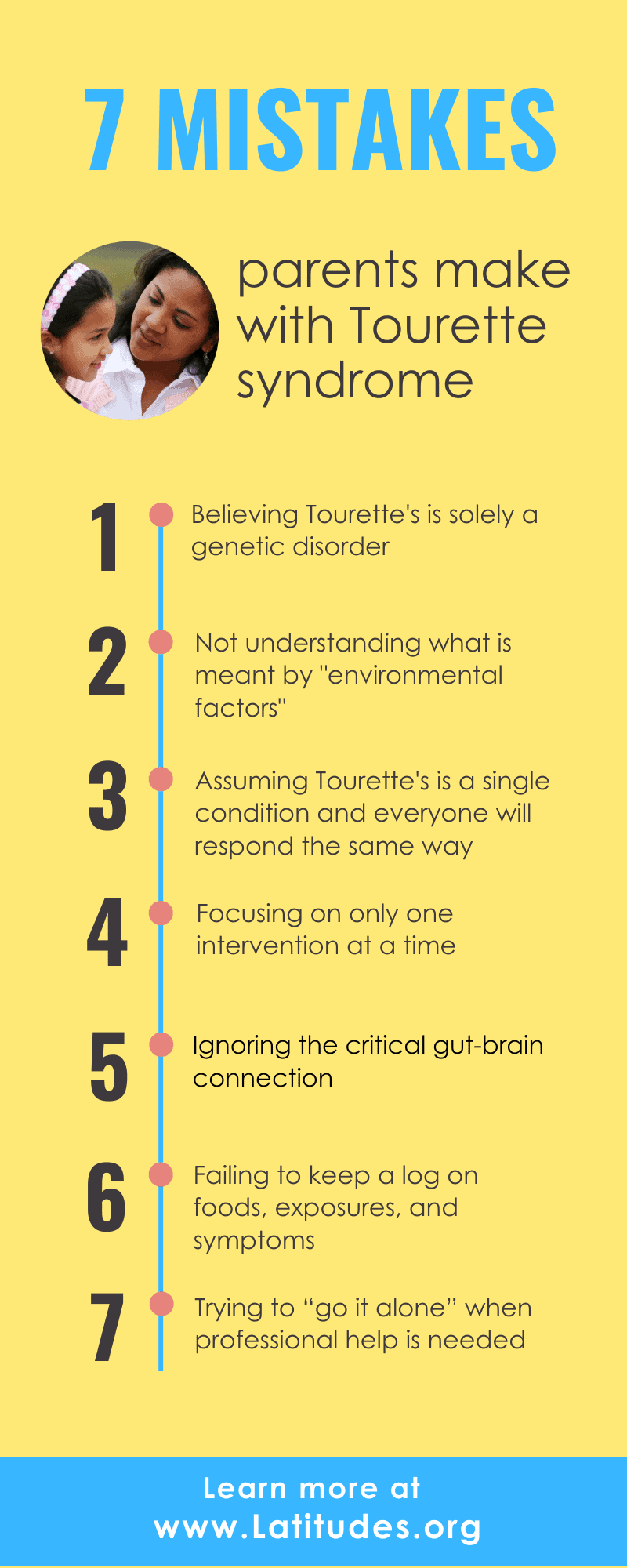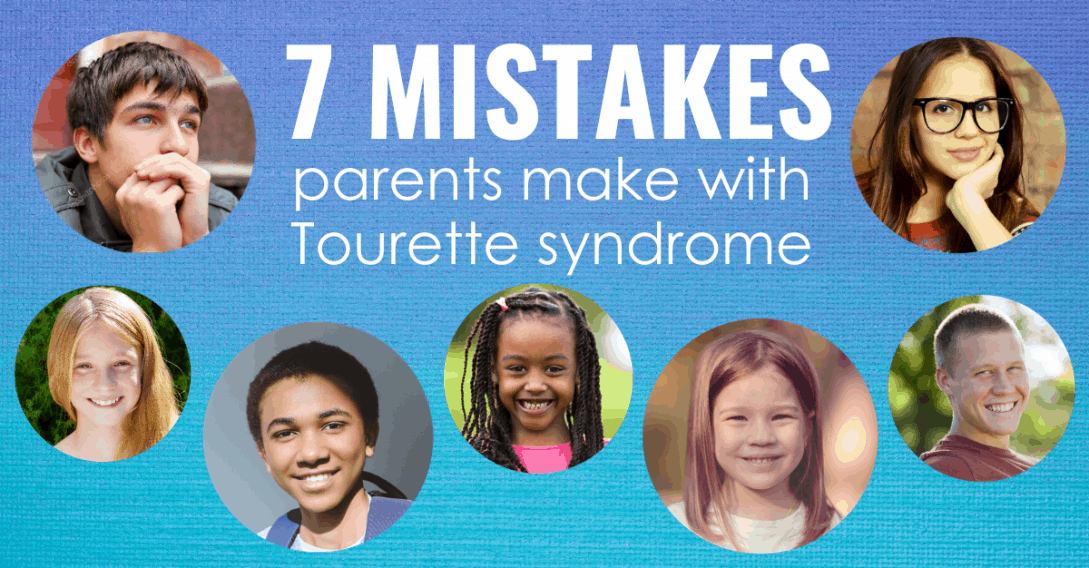7 Mistakes Parents Make with Tourette Syndrome
 Is this the right bus for you?
Is this the right bus for you?
When I first started Latitudes.org, I was advised: “Let people know know where you’re going, and if they aren’t interested, suggest they get off the bus.” A recent conversation inspired me to re-post this article, first offered a few years ago.
This list of seven “mistakes” is shared with that advice in mind.
If you are hoping to find integrative or natural approaches that could help reduce tic symptoms, you’re on the right bus. If not, this article is not for you.
Now, instead of using the term mistakes, I could have called them obstacles. Or pitfalls. Or oversights. These are all words to convey that there are issues that can block your progress as you try to reduce tics. But I wanted to make it clear that these truly are mistakes that can be remedied if you know to look out for them.
I have focused on parents of kids in this blog, but the information applies equally to adults with Tourette’s.
As I often point out, there’s no one answer for everyone, and no guarantee that you will find what you are looking for. But your chances for success are better if you have an understanding of the seven points below.
This is the advice I wish I had been given when my son’s Tourette syndrome symptoms first started. His condition gradually worsened until it was distressing for the whole family. Fortunately, I found the answers to healing that we needed. Once I did, I got on this bus and never got off. Meanwhile, thousands of others have joined me. You have to decide for yourself if this is the right bus for you.
Counseling and listening for 25+ years
As editor of Latitudes.org and director of ACN, I’ve had countless conversations with families who are searching for help in dealing with Tourette’s. They want to know what they can do to avoid standard medications that have the potential for serious, negative side effects.
Together, we brainstormed possible solutions to their situation, and in follow up, discussed what challenges they encountered and what approaches did—or did not—work for them.
During these sessions, recurring themes surfaced, themes that can impede progress in finding solutions to tic symptoms. I’d like to share some of those with you and provide recommended resources. The list includes several common issues, although these are not the only stumbling blocks.
If you see yourself in any of these “mistakes,” it’s understandable. After all, we count on conventional medicine and national advocacy groups for advice. Yet, for 40+ years these sources have failed us for Tourette syndrome. They dismiss the role of diet and other environmental links, without basis. The tic community has been indoctrinated with the false message that there’s little people can do to help control symptoms.
It’s not easy to break free from standard advice and search for answers on your own. Congratulations on taking the first steps. The list below is offered to help steer you in new directions.
Mistake #1 Believing Tourette’s is solely a genetic disorder
 Tourette syndrome has been proven to be both a genetic AND an environmental disorder. While this is accepted in the scientific research community, it is ignored by conventional physicians in clinical practice, and that’s a major problem.
Tourette syndrome has been proven to be both a genetic AND an environmental disorder. While this is accepted in the scientific research community, it is ignored by conventional physicians in clinical practice, and that’s a major problem.
Environmental influences include issues like diet, nutrients, allergens, medications, infection, mental/emotional state, toxins, and more. (See #2 below for more on this.)
Unfortunately, conventional neurologists and pediatricians rarely address environmental factors for Tourette’s, aside from stress. They seem to be unaware of research that links tics to allergies and immune functioning. They don’t question why symptoms are worse at one time and better at another. They don’t look for “causes” of the tics in the same way that doctors typically look for what is causing a headache, or difficulty breathing, for example. This is because they don’t question the out-dated concept that Tourette’s is a genetics-only disorder, even when this leaves them few options for successful treatment.
Depending on a child’s age and severity of tic symptoms, a doctor treating Tourette syndrome may recommend reducing stress, taking medications, pursuing behavioral therapy, or resorting to deep brain stimulation (which requires electrodes to be implanted in the brain).
The most beneficial and logical first step would be to find out what is triggering the tics, what is making them worse or allowing them to be better at different times. But that’s not the norm.
The worst part of this scenario is that doctors, while failing to provide help in this area, often discourage you from looking for your own answers to Tourette syndrome:
- “Don’t get your hopes up.”
- “Diet doesn’t make a difference.”
- “It’s genetic. You’re wasting your time.”
- “There’s nothing you can do.”
- “Studies don’t support it.” (Editor: That’s because studies haven’t been done!)
Don’t fall into the “it’s all genetics” trap. It’s a dead end. This article offers several resources that can help you find answers that have the potential to change your child’s life.
No one can guarantee that you will find the answers you need. But many families report it was well worth the effort to try. Read success stories on our website written by others for encouragement.
As you embark on this journey, be aware that family members may not be supportive. Your child may have heard the doctor say diet doesn’t matter. There will be challenges. But keep your goal in mind and be strong in your resolve.
Mistake #2 Not understanding what is meant by “environmental factors”
 We tend to think of the term environment as it relates to weather or climate change. But the word has a different meaning in medicine.
We tend to think of the term environment as it relates to weather or climate change. But the word has a different meaning in medicine.
In medicine, your environment refers to just about everything outside genetics. Consider what you eat, drink, breathe, touch, smell, and think or feel, as environmental factors. There’s a medical field called “Environmental Medicine” that focuses in this area.
Being educated on this topic is valuable, because controlling troublesome environmental factors whenever possible can make a big difference in symptoms.
It can seem overwhelming to consider all of the types of issues that may play a role in developing or aggravating tics. But you don’t have to absorb all the concepts at once, and we offer free worksheets to help you. Also, the factors that affect your case may be limited–it’s not like you have to upend your lifestyle.
The more you learn, the more comfortable you will be with the approach. And, the more likely you’ll be able to zero in on the environmental factors that are affecting your situation.
Here’s a way to think about the environment for tics
Imagine you child woke up and then spent the next few hours at home, until lunch time. You noticed that tics were mild when she woke up, but they are much more significant by noon. An environmental review of this situation could include things like:
- Did she sleep well?
- Might she have cold or other infection?
- What did she eat and drink for breakfast and snacks?
- Did she take medications or supplements?
- Did she play video games, watch TV, or spend time on a mobile device?
- Are there scented candles or “plug-ins” in the rooms she was in?
- Did she get exposed to a family member’s perfume or aftershave?
- Is she worried? Did she get frustrated or have a problem with a sibling?
- Did she play with a pet?
- Are any of the rooms where she spent time moldy or dusty?
- Did she encounter strong cleansers, scented detergents/fabric softener, or pesticides?
These are just examples. The approach is like solving a puzzle, and it can take time to get a clear picture of what’s going on in your particular situation. Trust me, once you start the process will be second nature to explore what might be affecting her nervous system. (See Mistake #6 for more on this)
To get started, one of the best things you can do is write down what she did or was exposed to, and document symptoms. Without a log, your efforts will be scattered and you may give up too soon.
An environmental assessment moves your thinking beyond dietary change and nutritional supplements. Both can be important, but you need to be more comprehensive.
Don’t overlook allergens and chemicals as nervous system triggers. You might decide to change the diet, but if your child is reacting to something else, it will be harder to see positive results.
All of the topics included in the questions above can potentially aggravate tics in some people.
Mistake #3 Assuming Tourette’s is a single condition and everyone will respond in the same way
 We encourage families to share experiences in their search for answers to tic symptoms. It’s a great way to find new solutions. The more people who report that dietary change, or allergy control, or nutritional support, or “going chemical-free or natural” helped, for example, the more impetus there is for you to look in those directions.
We encourage families to share experiences in their search for answers to tic symptoms. It’s a great way to find new solutions. The more people who report that dietary change, or allergy control, or nutritional support, or “going chemical-free or natural” helped, for example, the more impetus there is for you to look in those directions.
We have to remember, though, that people are biologically different. Just looking at the different ways individuals react to the same medication confirms this.
It’s human nature to hope that if one child seemed better after taking B vitamins, or by staying off dairy (just as examples), that your child will also benefit. All things being equal, these approaches could truly help, if your child needed more B vitamins, or has an allergy or intolerance to dairy. But your youngster’s specific “triggers,” or underlying issues, may be completely different.
That doesn’t mean nutrient balancing and dietary change can’t help. It just means you need to be prepared to have a customized approach.
Read successful reports to come up with ideas to explore, then expand those ideas to meet the needs of your situation. Our latest book includes helpful insights from a large number of families, and explains more on identifying and removing triggers. (Link below)
Mistake # 4 Focusing on only one intervention at a time
 There’s a theory that when looking at the effectiveness of interventions, you should only do one thing at a time so you can evaluate each one separately. This approach has obvious value. But there’s a big caveat.
There’s a theory that when looking at the effectiveness of interventions, you should only do one thing at a time so you can evaluate each one separately. This approach has obvious value. But there’s a big caveat.
For nervous system disorders like Tourette’s, it is rare that there is a single factor that is causing or aggravating the tics. It’s possible, of course, but not typical.
I suggest using an approach I call “leveling the playing field” before you start in on key interventions you want to explore. The goal with this is to remove some common tic triggers first, ones that could throw your observations off if left untouched.
Let’s say you decide to remove gluten from the diet as a test, but you don’t limit toxic exposures the child is sensitive to. This will make it harder to evaluate the impact of any dietary change.
By taking some common sense steps that are a healthful for all of us, you will make your investigative work more fruitful. Below is what I suggest in my book Stop Your Tics by Learning What Triggers Them.
Preliminary steps to level the playing field:
- Eliminate foods/drinks with caffeine, artificial flavors, colors, and preservatives. Read labels and try to be strict and consistent.
- Make a note now of any foods that, based on previous observation, you suspect might be aggravating tics. Plan to avoid them.
- Cut way back on sweetened foods, including honey and maple syrup, and do not use artificial sweeteners like Nutrasweet/Equal.
- Replace chemically-scented products in the home with natural, unscented products.
- Create an allergy-free bedroom for the child.
- Reduce/limit television viewing, video games, and screen time throughout the day. (Of course this is now a special challenge with online learning.)
- Use organic foods when possible, and give your child purified water.
After a couple of weeks with these efforts, make a note if you see tics are reduced in frequency or severity. Once your hunt for specific triggers is underway, continue with the above suggestions as best you can.
The recommendation below is a classic book on environmental medicine that will open your eyes and serve as great introduction to the topic. An international best-seller, it was printed in 1991 and remains a fantastic resource for understanding environmental medicine.
In it, Dr. Doris Rapp describes a young boy with a diagnosis of severe Tourette syndrome. She tells how the family went on national television (The Phil Donahue Show) with her. She explained that his tics were in response to allergens and other environmental factors. With Dr. Rapp’s help the family was able to control his serious tics.
Mistake #5 Ignoring the critical gut-brain connection
 Neurologists and pediatricians don’t usually instruct families about a gut-brain connection with tics. That’s because they have not been taught that it exists.
Neurologists and pediatricians don’t usually instruct families about a gut-brain connection with tics. That’s because they have not been taught that it exists.
More than 30 years ago, pioneering leaders like Drs William Crook, Doris Rapp, William Philpott, and Marshall Mandell emphasized the important role of intestinal health for nervous system and brain functioning. They were lambasted and ridiculed by their peers. Yet during the last 10 years, especially, research has piled up to clearly support these doctors’ clinical findings.
Be aware that food allergies and sensitivities might be playing a key role in your child’s tics. For some, eating corn can set off tics. For someone else, the worst offender may be red food dye. Yet another may have to avoid gluen and a few other foods/drinks. The list of potential offenders can be substantial.
Importantly, a yeast overgrowth such as Candida albicans can wreck havoc, increasing the negative response to foods. While watching for food reactions, it’s wise to consider yeast overgrowth as underlying a gut-brain reaction.
All types of regular sweets or sweeteners are reported to increase Candida albicans, a natural yeast that is present in everyone’s body. When it is kept in check, it is harmless. However, when it grows out of control, problems can ensue.
Friendly intestinal bacteria such as Bifidobacteria bifidum and Lactobaccillus acidophilus typically provide a balance to keep C albicans and other yeasts in check. Besides improper diet and sweets, antibiotics, nutritional deficiencies, corticosteroids, and immune deficiencies can allow C albicans to increase out of control, resulting in an imbalance in intestinal flora.
One consequence of this overgrowth is leaky gut syndrome, in which the lining of the intestinal tract is damaged, allowing food-related substances to enter the bloodstream and create numerous health problems. C albicans overgrowth can play a significant role in ADHD, OCD, depression, tic disorders, and autism, along with a number of autoimmune conditions.
The reference below offers a concise explanation of how candida can be assessed and treated.
Mistake #6 Failing to keep a log on foods, exposures, and symptoms
 Keeping a detailed log (as best you can!) has been the answer for many parents. It’s a good idea to keep a record of foods and drinks, exposures, and activities during the day, along with tic symptoms and whether they are better or worse.
Keeping a detailed log (as best you can!) has been the answer for many parents. It’s a good idea to keep a record of foods and drinks, exposures, and activities during the day, along with tic symptoms and whether they are better or worse.
Approaches vary, with some parents doing detailed recording of the times per minute or per hour of some tics, others using a scale of 1 to 10, while still others might create their own plan, such as just using a symbol, like an up or down arrow or smiley face to show if symptoms were better or worse.
Whatever works for you, please know that the exercise can be useful. By writing things down, you have the chance to go back later and review your notations, looking for clues.
It may seem like a lot of work. But let’s be real. You are investigating the cause of a condition that the medical community has no good answers for! Your effort in itself is amazing. Yes, it’s going to take some detective work, but you can pace yourself and just do as much as you are comfortable with.
I’ve had parents tell me it was easier to keep a log than to lie in bed at night in despair, assuming there was nothing they could do to help their child.
Ready-made charts (for you and your child) can help you with this effort. See the link below.
Mistake # 7 Trying to “go it alone” when professional help is needed
 Sometimes a case is too complex, or a parent too overwhelmed, to successfully undertake the trials needed to solve your child’s health issues.
Sometimes a case is too complex, or a parent too overwhelmed, to successfully undertake the trials needed to solve your child’s health issues.
The advice of an integrative practitioner can be invaluable in exploring new approaches, or in determining if specialized laboratory testing and/or medical intervention is required.
Being an “investigator” and implementing changes yourself may require more effort and energy than you have. That’s where an expert practitioner can lend needed support in directing your efforts.
In some cases, physicians or practitioners skilled in nutritional medicine, chemical sensitivities, detoxification, immune function and allergy, infectious disease, bodywork, dentistry, or other fields may be helpful. It all depends on what your child’s underlying health issues are that are part of the overall picture. We cover these topics in our books .
To make this point, Dr. Doris Rapp often used the example of trying to relieve the pain of a sore on your foot. If your foot hurts, you can try interventions like a salve or a bandaid, but if the problem stems from a nail in your shoe, you have to remove the nail.
Sometimes your own efforts will give you the solutions you are hoping for, but other times you’ll need to reach out for assistance to have the best outcome.
As you go on this journey to help your child, keep expanding your self-education. If you hit a wall in your efforts, try to avoid frustration. Take a break and start again, and look for support. Above all, keep an open mind. You are your child’s best hope.











I see myself for sure with my 10 year old. We’ve made some progress but I think I need to go back to the beginning and start over with a different perspective. This was helpful.
Hi Pepper, I’m glad you were able to see how a new perspective might help you. It’s easy to overlook some steps while as parents we have so-o-o much on our plate to deal with. Taking a fresh look can be helpful and I hope you can find the answers you need.
Being at home with my kids more has given me time to think about some of these things (already had your book). We have a natural home, no toxins and perfume etc. I’ve improved diet, low sugar, no artificial etc. That helped my kiddo with tics. Now watching for reactions to different foods and keeping a log. It’s work but I’m giving it a good try. Tics are also worse after playing on my phone but I’m having a hard time saying no to that.
Hi LKD, it sounds like you have taken some very positive steps. Great that the home is nontoxic and some key dietary changes have been made. I think (hope!) you’ll find that a log is really helpful to document any food reactions. As for the phone triggering tics, I know many parents would agree with that observation.Try to limit the time and focus on downloaded items that can be viewed without the internet connection (to avoid EMFs). Thanks for writing!
I heard about this on FB. I’ve always been told it is hereditary. Isnt that true? Our doctor said to try to help my son relax, it will be worse if he is stressed. I see that. And if he is excited tics are worse. I read this but it is all so new to me. You said to keep an open mind and i’ll try. I really want to help him.
Hi Alejandra, Welcome to our website. :) To answer your question, yes, people with Tourette syndrome are assumed to have a genetic predisposition (although the genes have been difficult to identify). But there are also other lifestyle or environmental things that can affect symptoms. As an example, think of allergies. They often run in families, but what someone does to avoid exposure to allergens makes a big difference. Keep that open mind! I hope you find lots of information on the site to help you. Good luck.
On number 5 you’re saying that even natural snacks with honey are not good?
Hi JSK — it’s not that snacks with honey are not good for a person in general. They can be nutritious (and tasty too!)–but if someone is having trouble with a leaky gut or a candida overgrowth, then natural sweeteners like honey as well as agave, maple syrup, date sugar etc can all “feed” the problem–not just corn syrup and cane sugar. So you would want to reduce the amount of all kinds of sweets. A reaction to dried fruit is similar–“natural” fruit rollups or other dried fruit can be troublesome as far as candida is concerned, until the gut is healed. And then, easy does it. Same goes for fruit juices.
Not everyone sees a connection with tics and candida. But it appears to be quite common from what we hear from families. It would be relatively easy to conduct a study with laboratory tests to measure gut health in people with Tourette’s, but leaders in the field have not shown an interest in that.